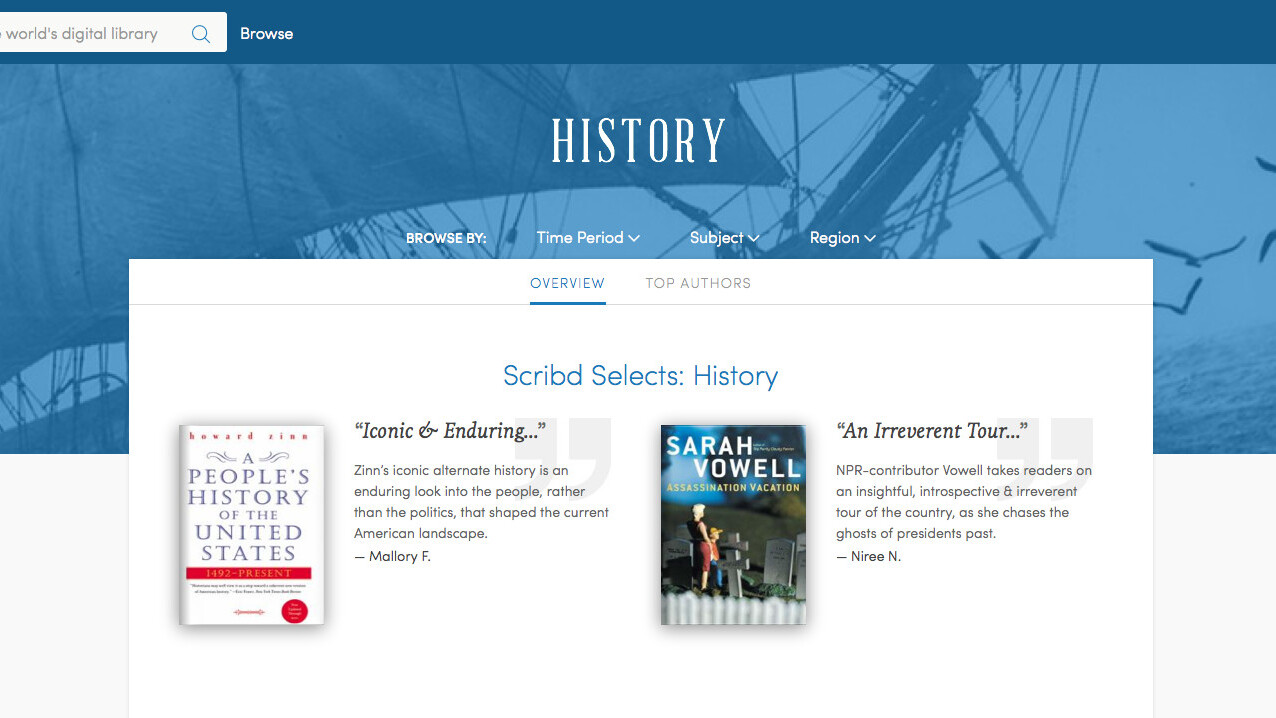
All-you-can-read subscription ebook service Scribd has received an overhaul with new smart discovery features that should help you browse for new content to read. The new look launches today on the Web and is coming to the firm’s mobile apps in the next few weeks.
To undertake the redesign, Scribd brought on a team of editors to create a category tree from scratch that goes beyond current classification systems. The tree contains 1,800 categories.
Scribd also took a Pandora-like approach to tagging content so that users can find books with highly-specific themes. Similar to the Music Genome Project, a team of editors has gone through and categorized “tens of thousands” different elements of the catalog’s books so that Scribd can come up with better suggestions.

For instance, you can now search Scribd for murder mysteries that are set in a particular city. The Fantasy section has sub-genres for “Witches and Sorceresses” and “Ghosts, Spirits and Poltergeists.”
Scribd took a conceptual approach to its ebook service that draws on the layout of physical bookstores. Curated collections are displayed much like featured staff picks at your favorite local shop.
On the backend, Scribd is relying on personalization algorithms that learn from your reading history. The result is a combination of human judgment and data-driven recommendations.
Scribd co-founder and CTO Jared Friedman cited researcher and author Dan Ariely – who recently launched a time management app – and his theory about a “zero price effect” as part of the inspiration for the new structure. According to Ariely, consumer behavior changes significantly when the incremental price of a product drops to zero.
In other words, the way that we read books changes when we’re not charged for them. Now that there’s no monetary risk involved, I can download a book I wouldn’t otherwise have bought and skim a few pages to see if I’ll like it. Friedman claims that Scribd’s data for its subscription service supports Ariely’s findings.

“With subscription services, I think there’s a real opportunity to drive a lot more exposure to the backlist,” he said. “That’s why we feel there’s such a great opportunity at the combination of services and better book discovery.”
Now that Amazon has launched its Kindle Unlimited subscription service, the all-you-can-read space is a crowded one. Friedman didn’t sound worried when I asked about his newest competitor. According to him, Scribd has seen upticks in publisher talks, press coverage and consumer interest.
Scribd, for its part, will remain focused on trying to build “the best consumer experience” in the industry, starting with the rollout of today’s new discovery features.
While major publishers provide the foundation for Scribd, independent authors have also been performing well. According to Friedman, the service has been indie publisher Smashwords’ faster growing retailer ever.
“Independently published work is going to be a big focus of Scribd going forward, and I’m hoping that new products coming out, like the new browsing experience, is going to help even more with distribution,” he said.
Get the TNW newsletter
Get the most important tech news in your inbox each week.





